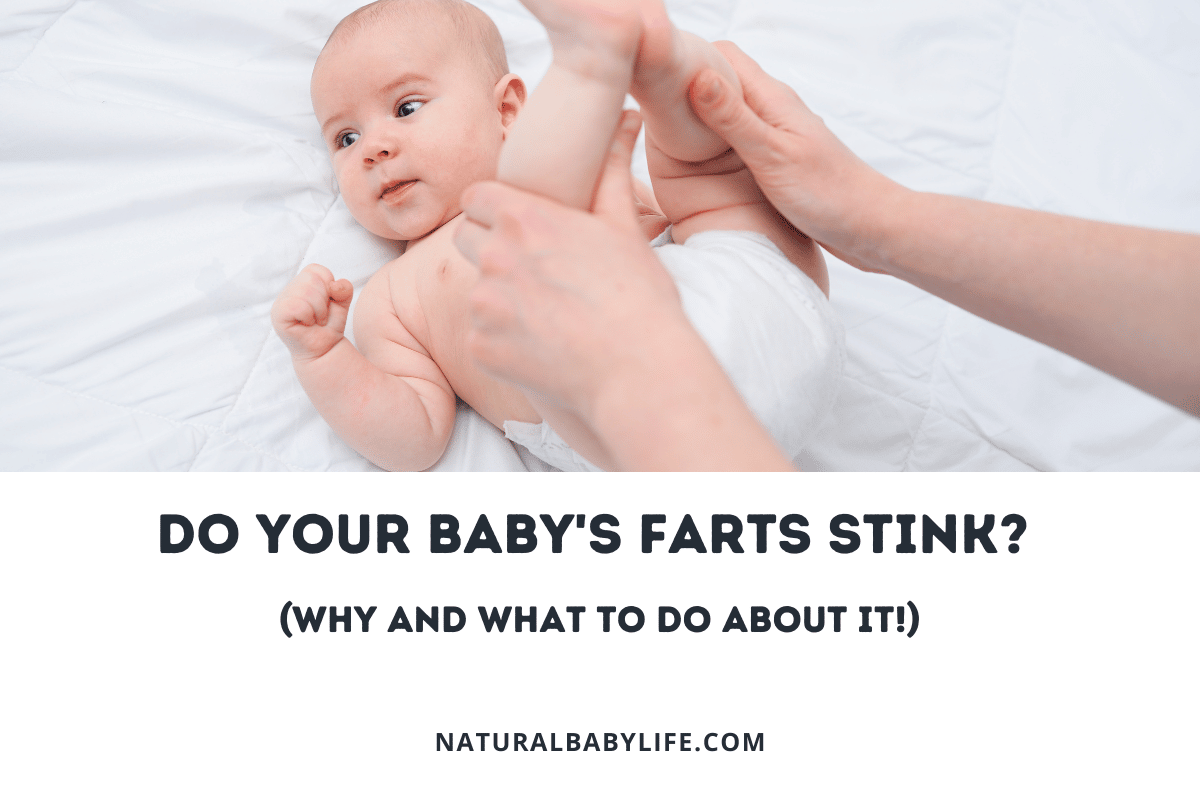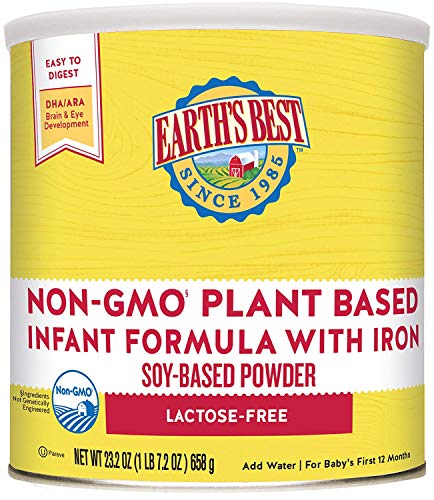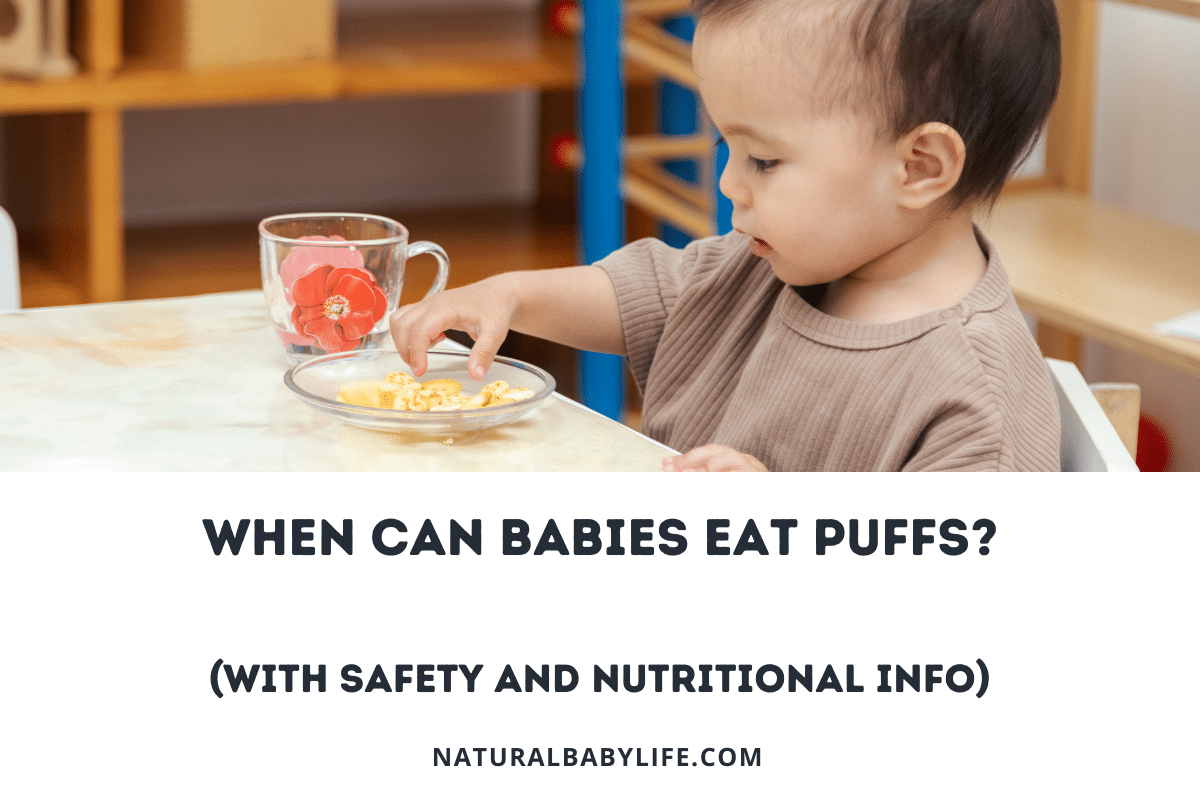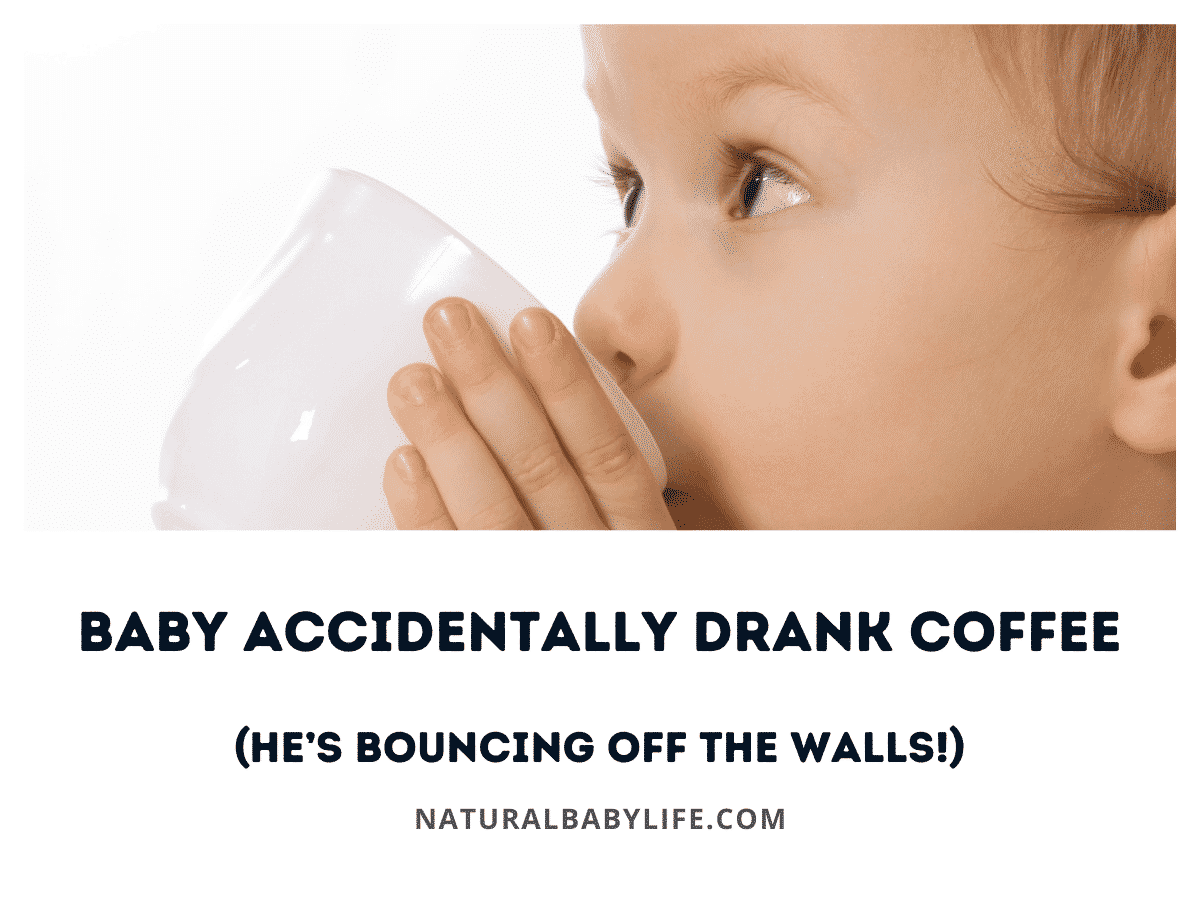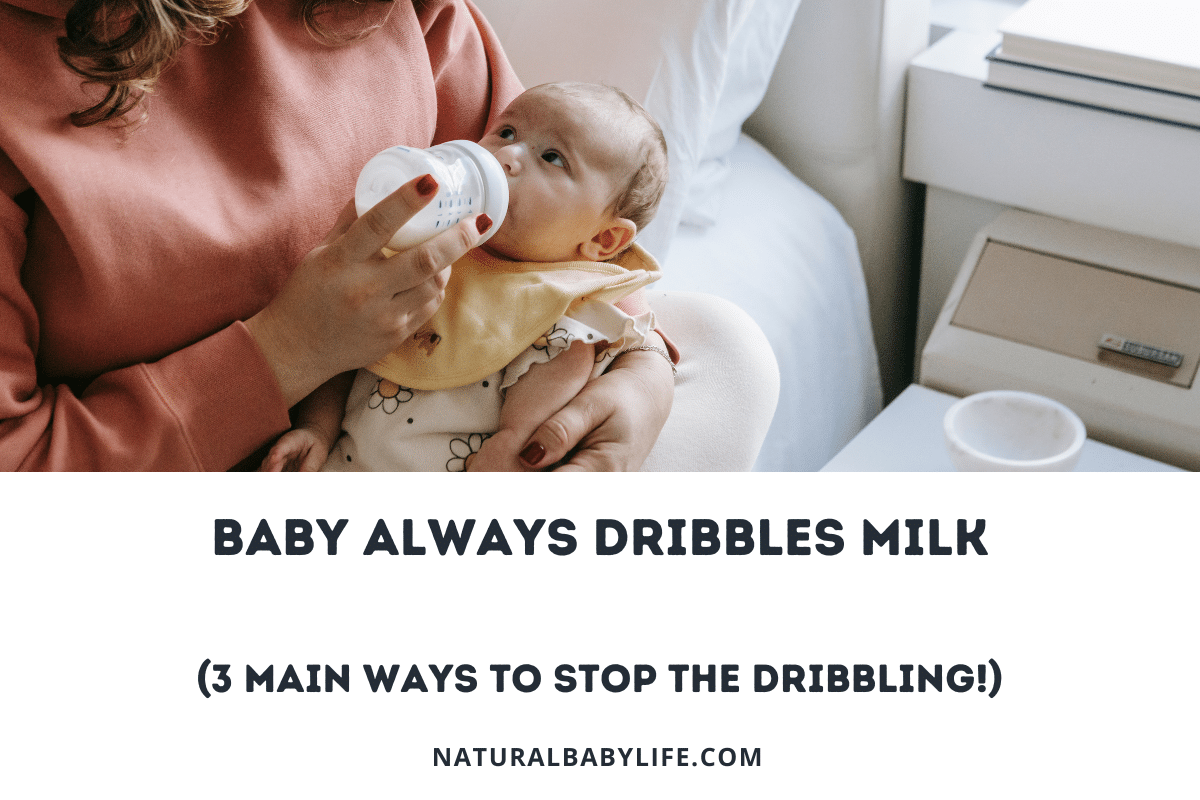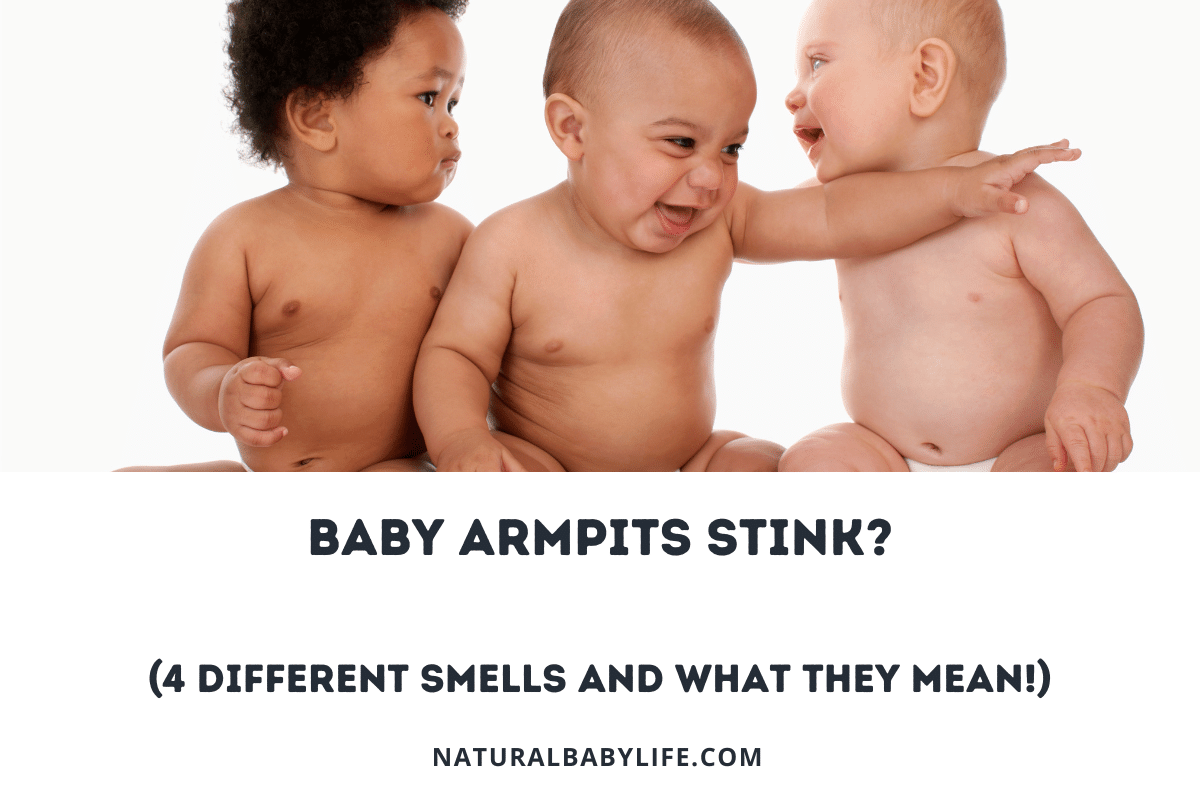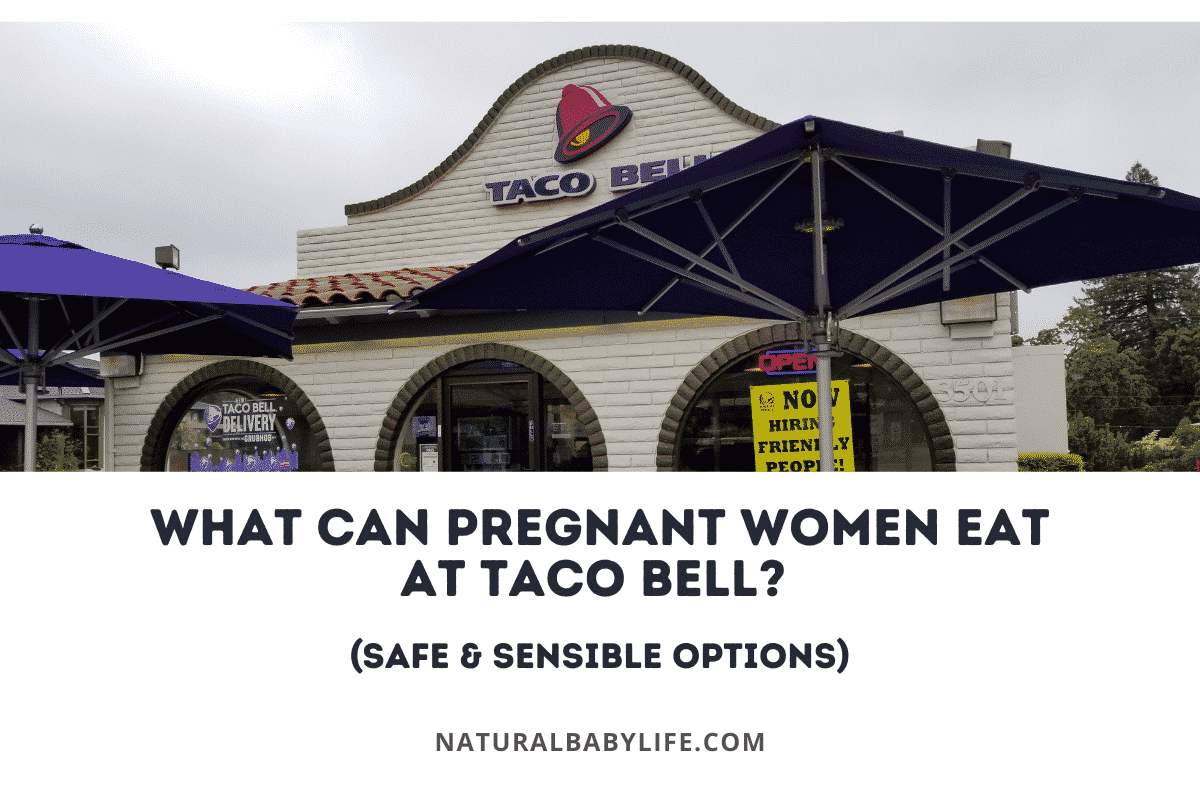Parents love their babies so much that it is easy to overlook it when baby farts stink or smell worse than normal. If they are truly smelly, however, then it is necessary to investigate why in case more serious issues are involved.
It is normal for breastfed, formula fed, or solid food eating babies to have occasional gas and stomach upset. If a baby’s farts smell like sulfur, rotten eggs, cabbage, sour milk, metal, or plastic, there may be a food sensitivity, allergy, infection, or other digestive issues causing the problem. Proper feeding, burping, and diet can help!
Read on to learn all about what causes baby gas, what causes baby gas to smell bad, what different baby fart smells mean, how to fix the problem, and when to worry and call the doctor!
Table of Contents
Babies and gas – what is normal for newborns and infants?
As a parent of four children I can tell you with absolute certainty that every baby farts, poops, burps, and throws up. In fact, if something can go wrong with bodily fluids, it will go wrong and it will end up on your new shirt in an Olive Garden bathroom that you’ll have to discreetly sneak out of before finishing your meal.
Ask me how I know.
Anyway, everyone produces some gas as a byproduct of digesting the food we eat and babies are no exception. Unlike adults, however, the digestive system of babies is still developing and sometimes struggles to keep up. As a result, your baby will sometimes have issues with gassiness, stomach upset, and general digestive issues.
Or, maybe your baby has smelly gas no no poop is coming out or you are worried that your baby needs to poop whether they are 6 weeks, 6 months, or any other age.
In most cases, baby farts smell pretty normal – not great, but not foul either. In some cases, your babies farts might smell pretty bad, including things like sulfur (rotten eggs), cabbage, sour milk, plastic, or metal. If your baby’s farts have a rotten or foul smell, you need to work to diagnose the issue and fix the underlying problem. In some cases, it will be worth a trip to the doctor to get things checked out.
As always, be sure to err on the side of caution anytime your baby’s health is a concern – we are not providing medical advice here!
Let’s take a closer look at what causes a baby’s farts to smell so bad!

What causes baby farts to smell bad
Many parents are all-too-familiar with the sweet smell of their precious little baby. What’s not so sweet, though, is the smell of a stinky baby diaper, which can sometimes surprise you. Babies can tend to have farts just as smelly as their parents. But just what are farts, anyway?
I admit it’s sometimes adorable to hear a little toot escaping from your little one’s diaper. Those tiny little odorless farts can strangely bring a smile to a new parent’s face. These regular farts are natural and shouldn’t be a cause for concern for you and your infant. However, if your little one is emitting strong smells for their backside, you may want to look into the cause and rule out any serious issues.
Farts are a mixture of swallowed air and gas that is made up of the bacteria in your intestines. So, naturally, many things can contribute to the smell and frequency of your baby’s flatulence. Here are some factors that may cause excessive flatulence in infants:
- An improper feeding technique that’s causing your baby to swallow too much air
- Gastrointestinal illness caused by a virus, bacteria, etc
- A newborn’s immature digestive system that hasn’t fully developed
- Digestive problems
- Overfeeding
- Food sensitivity (like with lactose)
- Colic or excessive crying can cause babies to suck air into their digestive system
- Excess crying
- Certain medications
- Long periods of inactivity or no movement (such as during sleeping)
- Stress
As for the smell of infant farts, it’s all about the conditions of the baby’s digestive system and the diet of a breastfeeding mother. Breastmilk, formula, the introduction of solid foods, digestion issues, and allergies can all affect the smell of an infant’s fart.
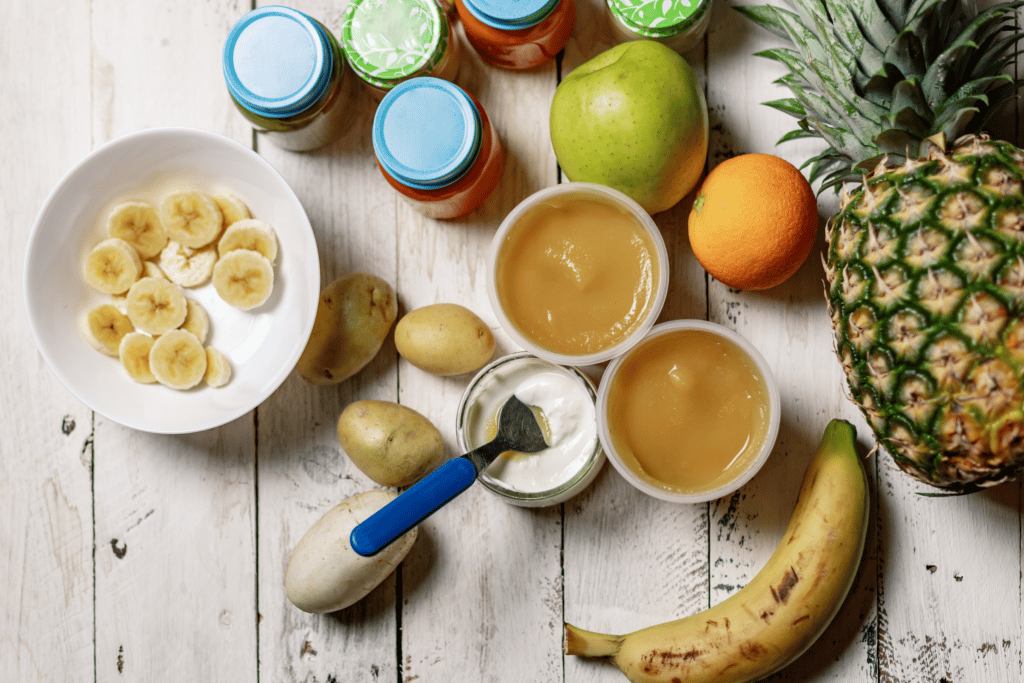
Can breastfed babies have stinky farts?
Breastfeeding is a beautiful bond between a mother and her child. It creates a connection like no other—which can often go beyond just physical touch. See, when mothers breastfeed their babies, they pass on the nutrients that their bodies create from the food they eat.
Breastfed babies can sometimes have stinky farts because they are exposed to different nutrients, flavors, and smells vicariously through their mother’s milk. Breastfed babies will have different smelling gas patterns based on what Momma has eaten in the past few hours.
For the most part, when you breastfeed, your baby will get a little taste of what you’ve had. Small bits of the food you eat can be passed to your baby through your breastmilk. So, if you eat something that makes you gassy, it may also be affecting your baby. You might also be worried about a breastfed baby with smelly gas and no poop. Add in a bit more
Here are some foods you may be eating that are causing your baby’s farts to be especially stinky:
- Eggs
- Onions
- Dairy
- Broccoli
- Asparagus
- Starches (potatoes, bread, cakes)
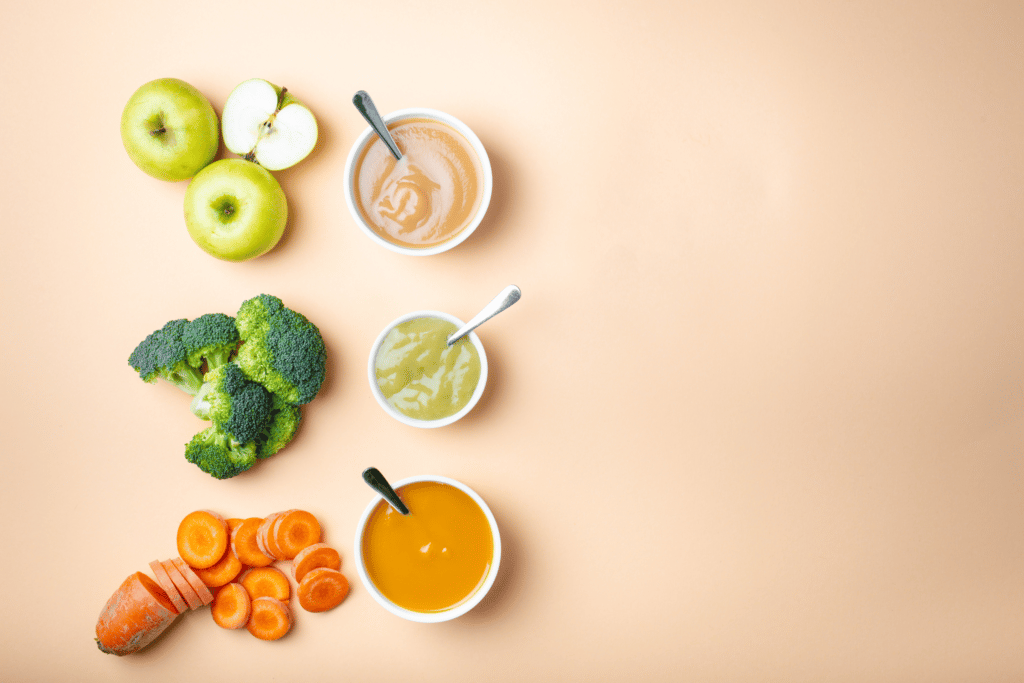
When your baby’s farts stink because of something you ate, it’s often not a reason to worry. You don’t have to drastically change your diet or remove certain foods from the menu. As long as your baby is gaining weight and having regular wet and dirty diapers, everything should be fine. If gas is causing your baby pain or discomfort, however, that may be a cause for concern. (See our tips later on in this article.)
Do formula fed baby farts stink worse?
The severity of a baby fart smell is all subjective. To you, your baby’s farts may be tolerable, but to another parent, they may smell as strong as a grown adult. Similar to breastfed babies, formula-fed babies can also develop gas issues from their milk and feeding habits.
While formula-fed babies are not introduced to extra nutrients via a mother’s milk, they can still experience digestive concerns that impact the smell and frequency of gas.
Some babies have a hard time digesting regular formula, which can result in gassiness that may have a strong smell. In fact, they might even be allergic to some ingredients in the formula. Consult with your child’s pediatrician to see if your baby’s inability to break down lactose is the reason for a smelly fart. Or, if you have started solid foods with your baby, pay attention to which foods result in smellier farts.
Why would a newborn’s farts smell bad?
Newborn babies are adorable in their innocence and itty bitty size. And before you become a parent, it can often be a challenge to imagine something so tiny making such a big smell. But, newborns definitely can have a pretty stinky fart.
When babies are first born, their whole bodies are experiencing sudden, drastic changes to get them ready for life outside the womb. So, during those first few weeks of life, your newborn has an immature digestive system. The baby is no longer relying on the mother’s nutrients being transferred directly through the umbilical cord. Now, the baby must somewhat independently feed and digest food on their own.
A newborn baby’s organs are still learning how to function, and they lack some of the probiotics that help with regular digestion. This means it can be more difficult for newborns to fully digest certain proteins, carbs, and fats that are found in a mother’s breast milk or baby formula. In the first month, this results in quick digestion, where food passes through your baby’s system quickly, often without fully breaking down. In turn, gas can get trapped in the intestines and cause newborns to fart a lot more often.
In adults, bacteria gather in the gastrointestinal tract to help digest foods more easily. However, babies are born with a clean gut, and the bacteria will take a while to develop in their systems. Newborn babies instead will have pro-bacteria in their systems, which can cause the production of gas and make your infant fart a lot—and make those farts pretty stinky.
Over time, your baby will grow, and their digestive system will mature with them.
By the way, I’ve also created resources on stinky baby hands, stinky baby feet, and stinky baby diapers if you want to check them out!
What can you learn from the smell of your baby’s gas?
In order to determine why your baby’s farts are extra smelly right now, it’s important to know what is normal when it comes to your child’s gas patterns. This includes how often they pass gas and what it typically smells like. Yes, this requires you to get a bit close to your little one! When you know what is normal for your child, you’ll be better able to judge what’s abnormal and a cause for concern.
Here are the most common smells that you are likely to experience with your baby’s farts:
- No smell at all
- Sulfur
- Rotten eggs
- Cabbage
- Sour Milk
- Metal
- Plastic
Baby farts have no smell at all
Although you might assume all farts are stinky, this isn’t always the case!
Because babies tend to cry pretty often, they end up sucking in excess air during the process. This excess air quickly makes it through their digestive system and comes out the other end as sweet baby fluffs!
Baby farts smell like sulfur
Does your baby’s fart smell like sulfur? Sulfur can make a fart smell pretty potent, even in a small amount. Certain fruits and veggies are high in sulfur and can get passed to your baby through breastmilk after you eat them.
These sulfur-rich vegetables include:
- Broccoli
- Cauliflower
- Brussel sprouts
- Beans
- Kale
- Spinach
These sulfur-veggie farts are often nothing to be concerned about; they’ll usually pass as your food completes its digestion. However, sulfur compounds from a meat-heavy diet can result in a stronger fart scent. These foods tend to be richer in fiber and starches. So, avoid or limit these foods if you want to reduce sulfur-smelling farts.
Baby farts smell like Rotten Eggs
Farts that smell like rotten eggs can be similar in scent to sulfur farts.
Breast milk could be a contributor to a rotten egg-smelling fart in infants. Certain foods, like eggs, of course, can have an impact on the smell of you and your breastfed baby’s gas. Eating fiber-rich foods and foods containing sulfur can also make a fart smell like a rotten egg. Take a look at your diet to see if anything could be an underlying cause of stinky farts.
Baby farts smell like Cabbage
One of the easiest ways to pinpoint why a baby’s fart smells the way it does it to think about which food the scent reminds you of. Cabbage is another cruciferous vegetable (like broccoli and cauliflower) that can have a strong impact on the smell of your baby’s farts if you’re breastfeeding. So, if your baby’s fart smells like cabbage and you breastfeed, think of the last time you enjoyed this dish.
Also, if your baby has recently started eating solid foods, consider aspects of their diet that could have an effect on the smell of their toots.
Baby farts smell like Sour Milk
The smell of sour milk on your infant’s farts can indicate trouble with digesting lactose.
It is possible for babies to consume too much lactose if you overfeed them. Breast Milk contains both foremilk (which contains more sugars) and hindmilk (which contains more fat). Too much foremilk can cause an excess of lactose that can cause gassiness in infants.
When you are breastfeeding, experts recommend that you empty your breast before moving your child to the next one. That way, your baby is getting the correct balance of nutrients.
You might also want to consider having a conversation with your doctor about switching to a lactose-free formula to help your baby’s sensitive stomach.
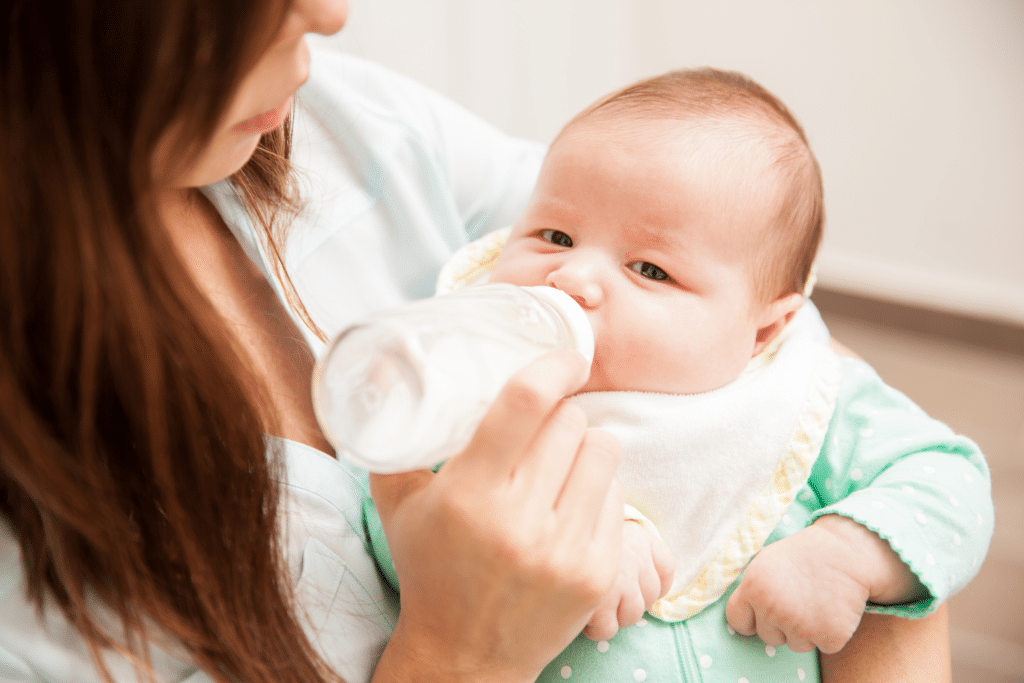
- High quality protein, carbohydrates, vitamins, minerals & essential fatty acids (DHA & ARA) to help support baby’s brain & eye development
- Lactose-free
- No artificial flavors, colors, preservatives, or potentially harmful synthetic pesticides/herbicides
Prices pulled from the Amazon Product Advertising API on:
Product prices and availability are accurate as of the date/time indicated and are subject to change. Any price and availability information displayed on [relevant Amazon Site(s), as applicable] at the time of purchase will apply to the purchase of this product.
Baby farts smell like Metal
If your baby’s farts smell like metal or iron, it could be a result of the iron in their diet.
However, strange or really foul-smelling gas could be an indicator of food sensitivity or an even more serious underlying medical issue. Some smelly gas means that a baby’s digestive system was unable to fully absorb nutrients into the body.
Every baby is different. Some babies are stinkier than others and may not pose a cause for concern. Even still, many infants will develop stinky farts over time. Pay attention to your baby’s normal so that you’ll be better prepared to determine when it’s time to contact the doctor.
Baby farts smell like Plastic or Rubber
This is a weird one, but not unheard of.
If you baby’s farts smell like plastic, burnt rubber, or some other kind of chemical smell then there could be issues with malabsorption or another underlying medical condition. Best to consult the doctor on this one!
Other symptoms of a gassy baby
Of course, there are other symptoms to be on the lookout for if you are worried that your baby has gas:
- Fussiness
- Lack of appetite
- Curling up into the fetal position
- Clenched fists
- Red, strained appearance
- Grunting and restlessness
Fussiness
Fussiness can manifest in different ways, such as crying or whining, being difficult to soothe, and exhibiting discomfort or agitation.
Lack of appetite
Lack of appetite in babies is a condition in which a baby has a decreased interest in feeding or is refusing to eat. A baby’s appetite can vary from day to day, but persistent or significant reduction in feeding can be a cause for concern.
Curling up into the fetal position
Curling up into a ball can be a natural response to pain as it allows the baby to protect their vulnerable organs and reduce the surface area exposed to pressure.
The fetal position is a natural and comforting position for babies as it mimics the position they were in while in the womb. Babies may also curl up when they are feeling overwhelmed or overstimulated and need to retreat to a familiar and soothing position.
Clenched fists
Clenching fists can also be a sign of stress or discomfort. Babies may clench their fists when they are feeling overwhelmed, overstimulated, or in pain.
Red, strained appearance
Straining or pushing during bowel movements can cause the baby’s face to turn red or purple, and they may appear uncomfortable or distressed.
Grunting and restlessness
Grunt-like sounds may also be a sign of digestive distress or discomfort. Babies who are constipated or experiencing gas pains may grunt or strain as they try to pass stool or gas.
Baby farting and gassiness – when to call the doctor
Farting is simply an indication that your baby is gassy. This can happen often when your baby is first born, between the ages of two weeks and four months. During this time, as babies are developing, many can become extra gassy, cranky, and fussy.
On average, many babies fart between 15-20 times daily. That’s almost as often as a fully-grown adult! However, excessive farting might mean that your baby is having a hard time with gas in their stomach. Even more, truly foul-smelling farts could mean that a more serious issue is present.
During this time, it’s best to observe your baby’s behavior to make sure he or she is not uncomfortable because of the gas. Look for cries of discomfort or your baby scrunching up his or her face while passing gas. If this gassiness is causing pain or cramping in your baby, speak with your child’s doctor to discuss ways to help relieve gas in your baby and to determine if there is a more serious underlying health issue.
How to help your baby relieve gas
If you notice that your baby is experiencing gas pretty often, there are many things you can do to help him or her pass the necessary gas and find a little bit of comfort. Try these techniques to relieve your baby’s gas the next time they have a little farting spell:
- Use a proper feeding position: Keep your baby’s head higher than the stomach; you can hold your baby at an angle, but make sure he or she is mostly vertical to allow milk and food to be easily swallowed
- Always burp your baby after a feeding: This can help your baby release gas when he or she can’t do it on their own; sometimes it can be beneficial to break a feeding in half with a little burping
- Check the bottle nipple: If your baby’s bottle is flowing too fast, it can cause your baby to swallow air and become gassy; instead, try one with a slower flow
- Give your baby a massage: A gentle tummy rub while your baby is lying on his or her back can help move around some gas in their system
- Alter your diet: If smelly farts is a no-go for you, examine the foods your baby (or you) are eating to make sure none are causing gas issues
- Bicycle kicks: Move the baby’s legs back and forth as in a bicycle motion. This will help the baby release gas. It helps with intestinal motion
- Tummy time: placing your baby on his or her stomach is also a good way to push out gas
Here is a quick video demonstrating how to massage your baby to relieve gas:
Other baby bowel issues to be on the lookout for
Here are some of the most common bowel issues for babies:
- Constipation: This occurs when a baby has difficulty passing stool. The stool may be hard, dry, or infrequent. Some common causes of constipation in babies include a change in diet, dehydration, and certain medications.
- Diarrhea: This is characterized by frequent and loose bowel movements. It can be caused by a variety of factors, including viral or bacterial infections, food allergies or intolerances, or a sudden change in diet.
- Colic: Colic is a condition in which a baby cries for several hours a day, usually in the late afternoon or evening. It is often caused by digestive issues, such as gas or acid reflux.
- Reflux: Reflux occurs when stomach contents flow back up into the esophagus, causing discomfort and sometimes vomiting. It is common in babies and can be caused by an immature digestive system or a food intolerance.
- Milk allergy or intolerance: Some babies may be allergic or intolerant to certain types of milk, which can cause digestive issues such as diarrhea, gas, or colic.
- Gastroesophageal reflux disease (GERD): This is a more severe form of reflux in which stomach acid irritates the esophagus, causing discomfort and sometimes damage. It may require medical treatment.
Check out the web story version of this article here!

